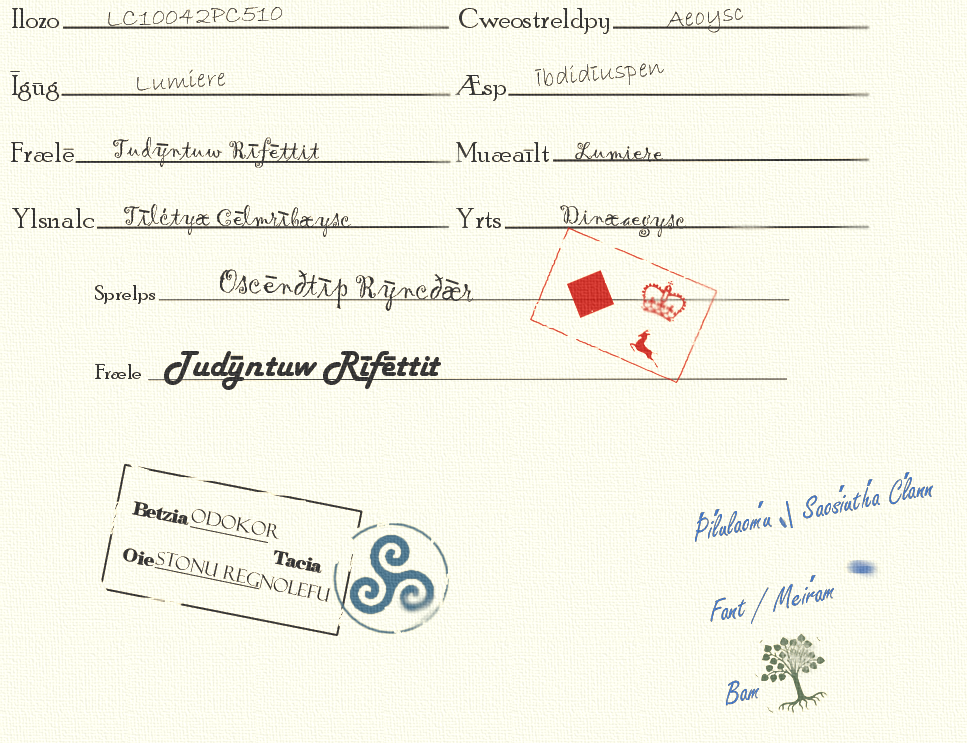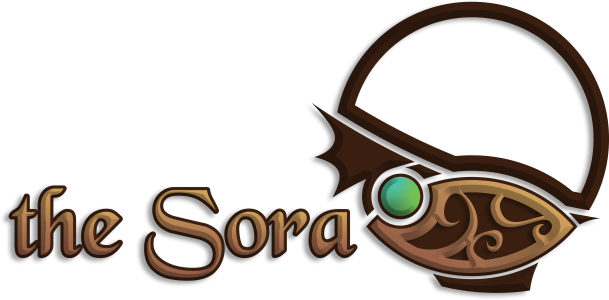Craft credentials are official paperwork carried by most
soracraft which identify the ownership,
realm of origin, and purpose of the craft. Credentials are required by most soraports before they will allow a craft to dock and many will confiscate craft which have no paperwork, assuming them to be stolen or otherwise unlawful. Each empire tends to produce its own credentials with differing information, though how widely they are accepted is variable.
History
Craft credentials largely borrow from the registrations of sea-going vessels of ages past. Most realms which reach the
Sora fairly quickly realize the necessity of credentials as exploration and private ownership of soracraft expand. As they begin to encounter other sorafaring realms, these credentials becoming increasingly important to regulate trade, combat smuggling, and increase the difficulty of piracy. In the present, all of the major empires, and most of the minor nations, require all new soracraft operating within their territory to be credentialed. A complex web of treaties, agreements, and laws regulate credentials, making handling them a major industry in itself.
Credentialing a Soracraft
While each empire has its own method for credentialing soracraft, a basic standard has arisen through convergent development. Newly created soracraft are issued preliminary credentials which include an identification code, the class of the craft, the realm of origin, and the creator (the shipwright for soraships, the breeder for lepicephs). These credentials are largely handled by a local governmental office called the soracraft registrar which issues these credentials in large batches to registered soracraft creators, who provide the basic information.
When a craft is initially sold to an owner, they take the preliminary credentials and pay a registration fee with the registrar to receive full credentials. These credentials require the identity of the owner (whether this be an individual, business, government, or other organization), the soraport the craft will operate out of, the name of the craft, and the primary purpose of the craft. If the owner plans to operate the craft out of a different port than the one it was built in, these credentials must be taken to that port to be validated, requiring additional fees. Craft names are typically required to be unique to the credentialing port, but this is often poorly enforced.

by J. Kastronis
The primary purpose of the craft are typically restricted based on the identity of the owner. Individuals are usually restricted to commercial purposes, such as trade, cargo transport, or passenger transportation. Businesses tend to be given broader purposes, including purposes such as industrial (e.g.
element mining), security, and entertainment. Governments have the most potential purposes and usually are the only ones permitted to register craft for military purposes.
For purposes of traveling from place to place, this level of credential is typically sufficient. However, most empires and nations require individual credentials allowing soraships to engage in trade, mass transport, or other commercial or industrial purposes to occur within their borders. This mostly requires filing for a supplementary credential with a port within those borders, who record the information from the primary credential. Some empires are extremely restrictive on providing supplementary credentials (e.g. the
Confederation of Doflein Realms and
Álfuríki), while others are extremely open (e.g. the
Heshian Syndicate). A few major, more important realms even require supplementary credentials of their own apart from the national ones.
When a soracraft is transferred to a new owner, previous certifications are no longer valid but must be retained by the new owners as proof of legitimate transfer. They must present these credentials when they file for their new certification, but are typically permitted to retain them. Old soracraft may require the retention of dozens of certifications, stretching back decades or more.
Use
Most credentials are issued in the form of a physical booklet which contains all the relevant information, signatures from the owners and registrar, and stamps or certificates for supplementary credentials. When a soracraft docks at a new soraport, these credentials are examined by customs officials who ensure everything has been properly documented, check previous ports visited, and finally issue their own arrival stamp. When the ship subsequently departs, they issue a departure stamp which shows the date of departure. They may additionally be checked by military personnel doing inspections of ships traveling through the Sora.
Failure to produce proper credentials can result in anything from confiscation of a ship to arrest to a fine. A complete lack of any credentials is often considered a sign that the ship has been stolen, hijacked, or is involved in illegal dealings, generally resulting in the ship being impounded until their legitimacy can be confirmed. Incomplete travel history often raises suspicion of illicit activity, but rarely results in anything more harsh than a fine.
Forgery
Due to the importance of the credentials, forgery is common. Correct identification of fake credentials is considered a vital skill for customs officials, who are highly trained and paid as a result. Because the empires and nations are not coordinated in their issuance of credentials, however, it can be difficult for fakes of minor nations to be properly evaluated. Thus these minor nations are frequent targets of forgeries from disreputable traders and pirates, spreading a reputation of untrustworthiness. On the other hand, several minor nations do issue credentials with few questions asked, charging high prices to do so. This has enabled several criminal organizations to gain the pretense of respectability, though savvy officials recognize their suspect nature.
The Heshian Syndicate and
Kamakari Mandate have both experimented with using magic to secure their credentials. Trials have been done using runes, alchemical ink, projected images, and magic mouths, but no solutions have yet caught on. Images and magic mouths have both proven more expensive than their worth, while runes and alchemical ink rely on the accepting customs officials to have the relevant items or spells to activate and evaluate them.




Comments